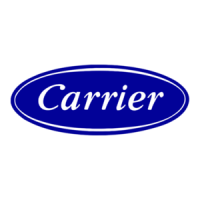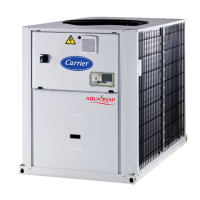54
Check water heat exchanger water loop
Water loop volume = ................... (litres)
Calculated volume = ................... (litres)
3.25 litres/nominal kW capacity for air conditioning
6.5 litres/nominal kW capacity for process cooling
Proper loop volume established
Proper loop corrosion inhibitor included ......... litres of ...........................
Proper loop freeze protection included (if required) ................ litres of ..............................
Water piping includes electric tape heater up to the water heat exchanger
Return water piping is equipped with a screen lter with a mesh size of 1.2 mm
Check pressure drop across water heat exchanger (no hydronic module) or the external static pressure (with hydronic module)
Entering water heat exchanger = .......... (kPa)
Leaving water heat exchanger = ........... (kPa)
Pressure drop (entering - leaving) = ..... (kPa)
WARNING (unit without hydronic module): Plot the pressure drop on the water heat exchanger ow/pressure drop curve to
determine the ow rate in l/s at the nominal operating conditions for the installation. For units with hydronic module, a
ow rate indication is displayed by the unit control (consulter the 30RB/30RQ Touch Pilot Junior control manual).
Flow rate from the pressure drop curve, l/s = ..........
Nominal ow rate, l/s = ......................
The ow rate in l/s is higher than the minimum unit ow rate
The ow rate in l/s corresponds to the specication of ................... (l/s)
Carry out the QUICK TEST function (see RB/30RQ Touch Pilot Junior control manual):
Check and register the conguration of the follwoing parameters:
Load sequence selection ....................................................................................................................................................................
Capacity ramp loading selection .......................................................................................................................................................
Start-up delay ......................................................................................................................................................................................
Burner section .....................................................................................................................................................................................
Pump control .......................................................................................................................................................................................
Set point reset mode ...........................................................................................................................................................................
Night-time capacity setback ..............................................................................................................................................................
Re-enter the set points (see controls section)
To start up the heat pump
WARNING: Be sure that all service valves are open, and that the pump is on before attempting to start this machine.
Once all checks have been made, start the unit in the “LOCAL ON” position.
Unit starts and operates properly.
Temperatures and pressures
WARNING: When the unit has run for a while and temperatures and pressures have stabilised, record the following:
Water heat exchanger entering water .................................... Water heat exchanger leaving water ......................................
Ambient temperature .............................................................
Circuit A suction pressure ....................................................... Circuit B suction pressure .......................................................
Circuit A discharge pressure ................................................... Circuit B discharge pressure ...................................................
Circuit A suction temperature ............................................... Circuit B suction temperature ................................................
Circuit A discharge temperature ............................................ Circuit B discharge temperature ............................................
Circuit A liquid line temperature ........................................... Circuit B liquid line temperature ...........................................
Circuit A suction superheat ..................................................... Circuit B suction superheat ....................................................
Circuit A electronic expansion device position ..................... Circuit B electronic expansion device position ....................
NOTES: ................................................................................................................................................................................................
................................................................................................................................................................................................................

